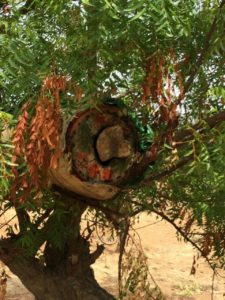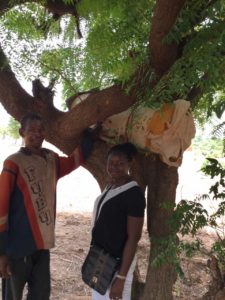There has been a long standing history of keeping bees in Lawra where the climate and vegetation are sufficiently fertile to produce the right conditions for beekeeping to survive successfully. For the past few years, beekeepers in Lawra have been few and far between, scattering into remote and hard to find places. There are few, if any, dedicated beekeepers either. Most of them practise other kinds of activities along side. Although these men have continued in their isolated places to produce honey, it is usually a disorganised affair and to boot they face a a wall of challenges which result in sparse and non-profit making amounts of honey.
The barriers these people face are mostly related to certain aspects of geography of this region of sub Saharan Africa. Bush burning often destroys hives which are made with the most rudimentary of materials: local pots, roofing material, odd bits of wood or metal for example. If metal is used for the hives, the sun will heat the metal up and kill the bees. Termites will attack wooden hives. Without protective clothing, bee stings are frequent and as the hives are situated in such remote places there is some unauthorised harvesting taking place. With lack of funding, no technical support and no cohesive plan to set a reasonable rate to sell the honey it is no surprise that bee keeping in Lawra finds itself at a low ebb.
You may have noticed that in the ATE Ramsbury shop/office we sell Ramsbury honey and a part of its selling price is donated to ATE to develop apiculture (to give it its proper name )in Lawra. This has been initiated by Mark Rees who produces the honey and who is an enthusiastic beekeeper. It was his idea to finance a feasibility study made locally in Ghana and it is this study that this article is based on. I’m new to bees, so apologies if there are any beekeeping howlers in this piece!
The study was undertaken by Kebo Kuu-I’m Edith (ATE Project Assistant) and congratulations are due to her for it is a comprensive and well researched document, you can read the full report here: ATE Bee keeping Research
In order to re invigorate the beekeepers and give them renewed enthusiasm for their ‘trade’ Edith recommends that there needs to be some reeducation in the basics of bee keeping eg finding suitable sites, providing Top Bar Hives, having a good swarm of bees (!), a supply of water, nectar and pollen from plants, decent harvesting equipment and protective clothing. Added to that it would be ideal if an Association could be established where by support would be received from others doing the same thing and advice on bee hive setting, honey harvesting and a cohesive plan in marketing and selling the product.
Edith feels there is a great opportunity here for the people of Lawra to help to raise their standard of living. Beekeeping could become a financially viable business and in turn stem the migration South of the young local people searching for a better life. There is high profit to be made and it could become another source of livelihood in Lawra.
We in Ramsbury wish the project great good luck and success and we will be interested in following its progress.
By Mair Reed, ATE volunteer

